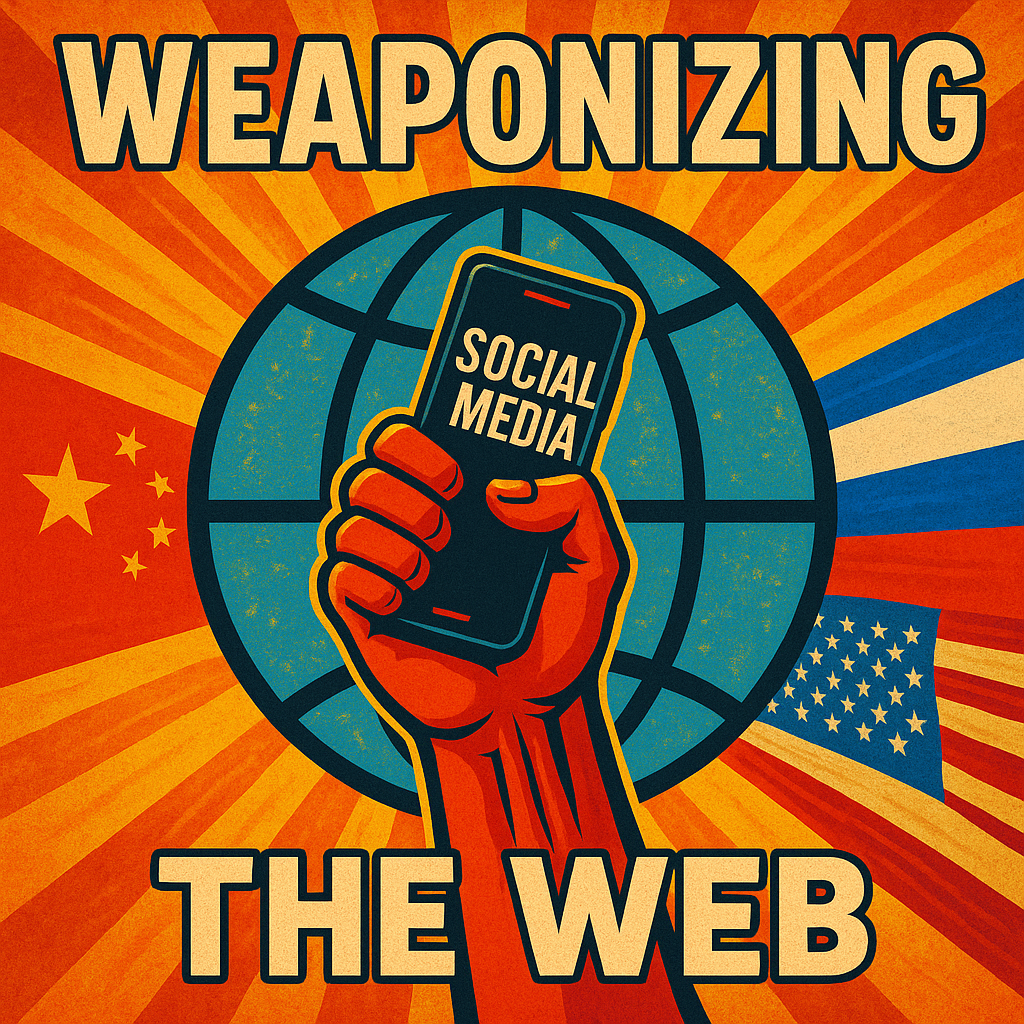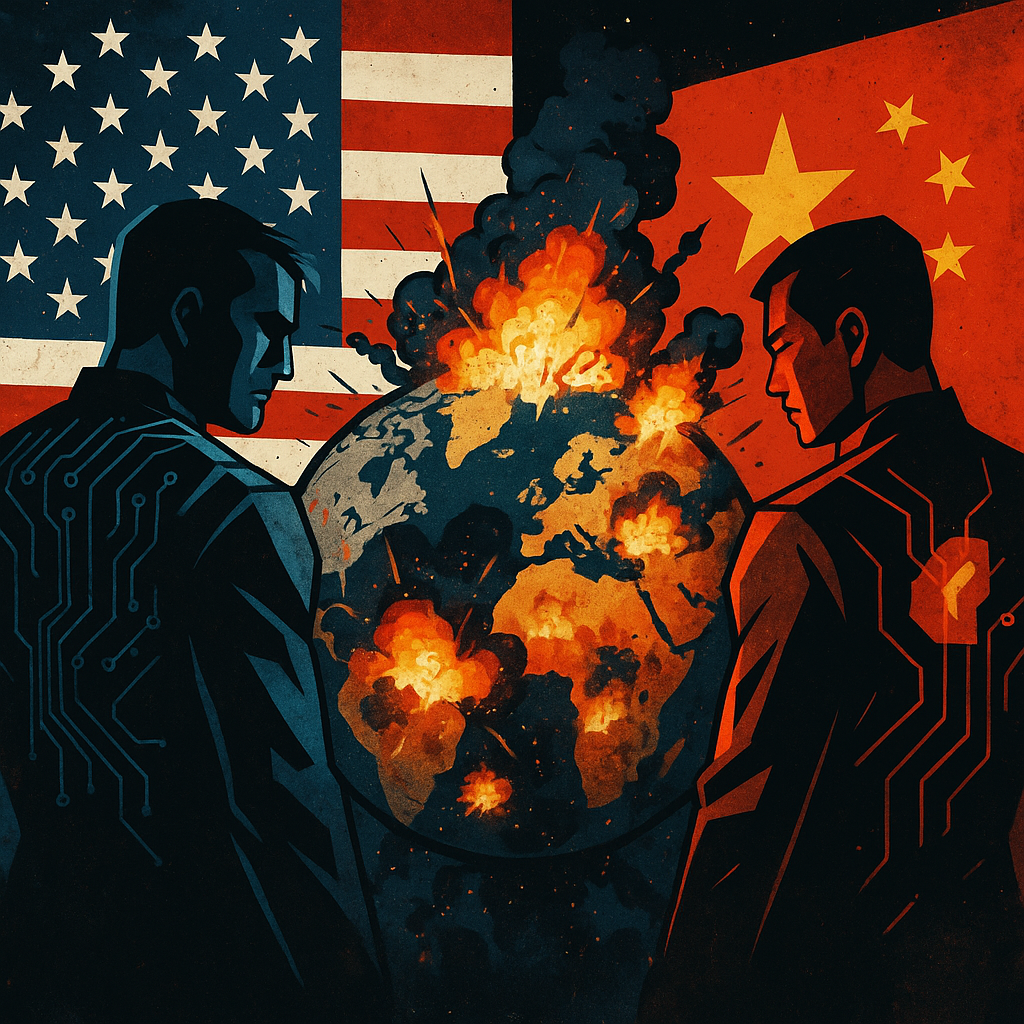How Governments and Mass Media Have Turned Social Media Into a Battlefield for Truth
Weaponizing the Web – When the internet was first introduced to the world, it was heralded as a revolutionary force—an unprecedented tool for free expression, democratic engagement, and global communication. The early 2000s saw an explosion of platforms where anyone, from dissidents in Tehran to students in Tunisia, could speak truth to power. But by the mid-2010s, that promise began to unravel.
Today, the internet—and social media in particular—is no longer a bastion of unfiltered truth. Instead, it’s become a weaponized arena of state-sponsored manipulation, disinformation, and digital censorship. Countries like China and Russia have taken the lead in engineering online ecosystems that suppress dissent at home and sow chaos abroad. But make no mistake—the trend is global, and democratic nations, including the United States, have also entered the fray.
This article dives deep into how governments are covertly shaping online narratives, the methods they use, and the implications for truth, freedom, and the future of democratic discourse.
Weaponizing the Web – The Original Promise: Social Media as a Tool of Liberation
Social media was once synonymous with political awakening. In the early 2010s, platforms like Twitter and Facebook played a key role in the Arab Spring, helping ordinary citizens in Egypt, Tunisia, and Libya mobilize protests, bypass state-run media, and share real-time updates with the world.
Tech visionaries like Mark Zuckerberg spoke of the “open graph” and the idea that connecting the world would make it better. Internet freedom became a U.S. foreign policy talking point, with then-Secretary of State Hillary Clinton proclaiming in 2010:
“We support a free and open Internet that fosters innovation, transparency, and accountability.”
But as quickly as social media lifted voices, it became a target for authoritarian regimes. And soon, those same platforms became instruments of control and disinformation.
Weaponizing the Web – China: The Model of Digital Authoritarianism
Since the 2010s, China has pioneered one of the most sophisticated models of internet control. The Great Firewall, launched in the early 2000s, expanded aggressively in the last decade to block Western platforms, filter search results, and monitor private chats.
But more insidiously, the Chinese Communist Party (CCP) has exported its tactics abroad.
1. The 50-Cent Army
China employs a massive force of state-backed commentators, often dubbed the “50-Cent Army,” who flood forums, comment sections, and platforms like Weibo, TikTok, and even Twitter with pro-government propaganda and deflection strategies. A Harvard University study estimated that China fabricates 448 million fake social media comments per year to distract or mislead public opinion during politically sensitive moments.
2. TikTok and Soft Censorship
Though TikTok is owned by ByteDance, a private company, it’s required by law to cooperate with state intelligence under China’s 2017 National Intelligence Law. Reports from The Guardian and The Intercept have revealed that TikTok once suppressed videos mentioning Tiananmen Square, Tibetan independence, and Hong Kong protests—raising serious questions about subtle censorship on a global scale.
Weaponizing the Web – Russia: Disinformation as a Foreign Policy Weapon
Where China’s approach is censorship-heavy, Russia’s model is disruption-centric. Under Vladimir Putin, the Kremlin has harnessed the chaos of the internet to advance its geopolitical interests through deception and division.
1. The Internet Research Agency (IRA)
The Internet Research Agency, based in St. Petersburg, gained global notoriety for its role in interfering with the 2016 U.S. presidential election. Using fake American personas, the IRA flooded Facebook, Twitter, and Instagram with polarizing content on race, immigration, gun rights, and police violence. The U.S. Senate Intelligence Committee confirmed in its 2019 report that this campaign reached over 126 million Americans.
As former FBI Director James Comey put it:
“They’re coming at us every day, using a variety of vectors to try and shape the way we think, the way we vote, the way we act.”
2. Ukraine: A Testing Ground
During its incursions into Crimea (2014) and Ukraine (2022), Russia launched simultaneous cyberattacks and propaganda blitzes. Ukrainian networks were flooded with false reports, doctored videos, and AI-generated profiles sowing confusion among citizens and allies. In the fog of war, controlling the narrative became just as vital as controlling the battlefield.
Weaponizing the Web – Democratic Nations Join the Game
It’s tempting to view this as a purely authoritarian issue, but Western democracies are not innocent. In fact, the U.S. and its allies have increasingly adopted similar methods—albeit more subtly.
1. Covert Influence Campaigns
In 2022, a report by Graphika and the Stanford Internet Observatory uncovered a coordinated U.S.-backed campaign that used fake accounts on Twitter and Facebook to promote pro-Western narratives in Central Asia and the Middle East. The accounts were quickly suspended once exposed, but the revelation signaled a shift: democracies are now using the same playbook they once condemned.
2. Domestic Censorship and Tech Collusion
During the COVID-19 pandemic, platforms like Facebook, YouTube, and Twitter worked closely with government agencies to flag, de-rank, or remove content deemed “misinformation”. While some interventions were necessary, critics argue the line between public health and political censorship became dangerously blurred.
The Twitter Files, released by journalists like Matt Taibbi and Bari Weiss, revealed internal communications between Twitter executives and federal agencies requesting moderation of politically sensitive topics, including the Hunter Biden laptop story ahead of the 2020 election.
Weaponizing the Web – Implications: Eroding Trust and Shaping Reality
The consequences of government manipulation on social media are profound and far-reaching.
- Public trust collapses when people discover they’ve been manipulated—not just by foreign actors, but by their own leaders.
- Echo chambers deepen as users retreat into ideological silos, convinced the truth is unknowable.
- Free speech suffers, as fear of algorithmic punishment or “soft bans” chills legitimate discourse.
Cybersecurity expert Renée DiResta summarizes it well:
“We’re no longer in an information age. We’re in a disinformation age, where every state actor plays the game, and truth itself is a casualty.”
Can We Reclaim the Internet’s Promise?
Rebuilding the internet as a force for liberation won’t be easy—but it is possible.
1. Demand Transparency
Platforms must be forced to disclose algorithmic biases, foreign influence operations, and moderation decisions. Users have a right to know how their feeds are curated and who’s shaping the conversation.
2. Encourage Decentralized Platforms
Decentralized or open-source platforms like Mastodon or BlueSky offer potential alternatives to corporate-controlled ecosystems. While not perfect, they remove some levers of government control and manipulation.
3. Teach Digital Literacy
Men—especially fathers, mentors, and educators—must take responsibility for teaching the next generation how to question, verify, and think critically. In a world awash in noise, discernment is the new survival skill.
4. Uphold Legal Safeguards
Governments must revisit free speech protections, data privacy laws, and antitrust legislation to prevent both state overreach and tech monopolies from controlling the digital public square.
Weaponizing the Web Final Thoughts: Don’t Surrender the Digital Battlefield
The internet was meant to be a revolution of voices, not a battleground for algorithmic propaganda and state-sponsored deception. While governments like China and Russia have shown just how far manipulation can go, we must hold democratic systems to higher standards—and keep them accountable when they fall short.
The war for truth is no longer fought with ink or bullets—it’s fought with bots, bandwidth, and belief. And if we don’t push back, we may find ourselves not just misinformed, but digitally enslaved by narratives we didn’t choose.
References & Resources:
- Harvard University Study on Chinese Propaganda: https://gking.harvard.edu/50c
- Stanford Internet Observatory Report: https://cyber.fsi.stanford.edu/io/news
- Twitter Files Archive via Matt Taibbi: https://substack.com/profile/125513-matt-taibbi
- Pew Research: Public Trust in Social Media News https://www.pewresearch.org
- Renee DiResta TED Talk: The Real Story of Fake News https://www.ted.com
Join the conversation: Have you noticed signs of manipulation in your social feeds? What steps do you take to separate truth from fiction online? Share your thoughts in the comments below.





